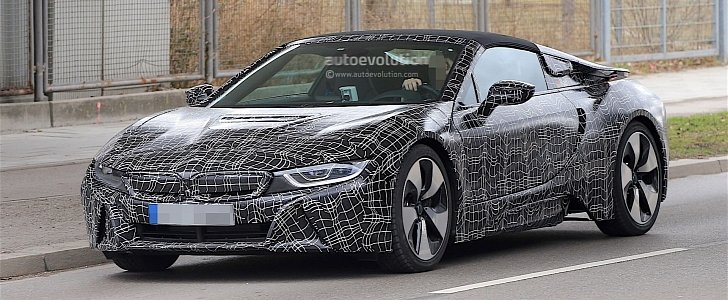At one point, BMW seemed to be among the leading traditional manufacturers when it came to battery-powered vehicles, and it was certainly the one to beat out of the premium brands.
Now, though, after the i3 all-electric city car proved to be a flop, the Bavarians have given mixed signals on what they plan for the future. The company said it was giving up on electric powertrains to focus on developing its own autonomous technology, only to come back and announce electric versions for the upcoming X3 SUV, 3 Series sedan, and one MINI model.
Well, while the fate of the 'i' division isn't clear (it might switch focus on autonomous driving while continuing to employ battery-powered drivetrains as well), BMW is definitely not out of the EV race. The management isn't too certain about the future - and who can blame them? - and it is now willing to take a gamble and bet big on battery power, so it has come up with a different system.
The Munich-based manufacturer wants to set up a flexible production environment that can vary its output depending on the market demand. In other words, it will continue with its traditional lineup, only more and more of them will offer the customer the choice between combustion engines, plug-in hybrid systems or all-electric powertrains.
“Nobody knows how many electric vehicles you’ll sell in 2020, 2021 and 2025,” Harald Krueger, the CEO of BMW, told Automotive News. “You don’t know how many plug-in hybrids you will sell, and you don’t know how many combustion engines you will sell. The only answer is flexibility [to] deliver all three.”
BMW plans to make its assembly lines change seamlessly between the three different propulsion systems, reducing the risk of idling certain plants due to weak demand for one powertrain or the other. This will require significant changes in both the layout of the assembly lines and the way the new vehicles are being designed.
All in all, the heads at BMW believe this is the best way to go forward, and also the safest one. Hardcore EV fans might not agree - they want to see manufacturers take a pledge and go all in on electricity, but they are not the ones entrusted with steering an old brand through today's murky waters, so what do they care?
In theory, BMW's plan sounds bombproof, but there are still a few issues. For instance, how competitive can the Bavarians make their EVs while sharing their platforms with ICE versions? How desirable will they be considering EV buyers want the world to know they drive battery-powered cars, and BMW's will be mostly indistinguishable from the regular gas and diesel models? But, most importantly, how expensive will the factory remodeling process turn out to be?
Considering the safe nature of BMW's path, the company has undoubtedly taken everything into consideration and is certain about its success. As always, time will tell.
Well, while the fate of the 'i' division isn't clear (it might switch focus on autonomous driving while continuing to employ battery-powered drivetrains as well), BMW is definitely not out of the EV race. The management isn't too certain about the future - and who can blame them? - and it is now willing to take a gamble and bet big on battery power, so it has come up with a different system.
The Munich-based manufacturer wants to set up a flexible production environment that can vary its output depending on the market demand. In other words, it will continue with its traditional lineup, only more and more of them will offer the customer the choice between combustion engines, plug-in hybrid systems or all-electric powertrains.
“Nobody knows how many electric vehicles you’ll sell in 2020, 2021 and 2025,” Harald Krueger, the CEO of BMW, told Automotive News. “You don’t know how many plug-in hybrids you will sell, and you don’t know how many combustion engines you will sell. The only answer is flexibility [to] deliver all three.”
BMW plans to make its assembly lines change seamlessly between the three different propulsion systems, reducing the risk of idling certain plants due to weak demand for one powertrain or the other. This will require significant changes in both the layout of the assembly lines and the way the new vehicles are being designed.
All in all, the heads at BMW believe this is the best way to go forward, and also the safest one. Hardcore EV fans might not agree - they want to see manufacturers take a pledge and go all in on electricity, but they are not the ones entrusted with steering an old brand through today's murky waters, so what do they care?
In theory, BMW's plan sounds bombproof, but there are still a few issues. For instance, how competitive can the Bavarians make their EVs while sharing their platforms with ICE versions? How desirable will they be considering EV buyers want the world to know they drive battery-powered cars, and BMW's will be mostly indistinguishable from the regular gas and diesel models? But, most importantly, how expensive will the factory remodeling process turn out to be?
Considering the safe nature of BMW's path, the company has undoubtedly taken everything into consideration and is certain about its success. As always, time will tell.





























